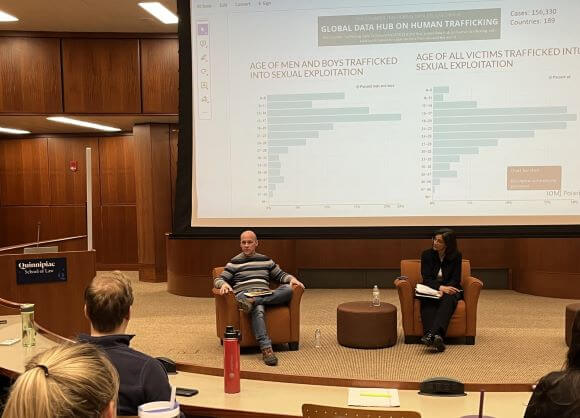
Quinnipiac Law hosts 'Broadening the scope: a conversation with males impacted by trafficking'
February 23, 2024

February 23, 2024

The panel discussion took place February 22 in the Quinnipiac School of Law ceremonial courtroom on the North Haven Campus. The event was hosted by the school’s Human Trafficking Prevention Project (HTPP), along with the Connecticut Bar Association and Connecticut Bar Foundation.
Quinnipiac HTPP vice chair Bianca Torres JD ’24 introduced the panel discussion as part of the fifth annual Human Trafficking Awareness Week: “The goal of Awareness Week is to bring the community in Connecticut together, and this year in particular to dismantle the myths that abound when it comes to human trafficking,” said Torres.
The discussion drew over 100 attendees from across Connecticut, including attorneys, healthcare professionals, public health and social services professionals, and representatives of non-profit organizations, together with Quinnipiac students, faculty, and alumni.
The panel was moderated by Sheila N. Hayre, Quinnipiac Clinical Professor of Law and faculty advisor for Quinnipiac HTPP. The evening’s expert panelists included a male survivor of sex trafficking who asked that his identity remain confidential, and Nathan Earl, Public Health Consultant for giantslayer. LLC. Giantslayer is a public health consultancy dedicated to preventing trauma and violence experienced by boys and men and 2SLGBTQ+ young people.
While the anti-sex trafficking movement has brought awareness to female survivors of trafficking, the sex and labor trafficking of males is often overlooked. According to experts, the underreporting of men and boys is rampant. Stigma and shame, coupled with gender-specific awareness efforts, programs, and services that use non-inclusive language and imagery, deter males from disclosing grooming, sexual exploitation, and trauma in general.
During their discussion, the panelists touched on the prevalence of human trafficking, stereotypes and myths, vulnerabilities and intersectionality, why trafficked persons stay in these situations and how they get out. They also shared solutions including recovery, services, and reforms.
Earl invited the night’s attendees to seek opportunities within their communities and their professions to combat the underreporting of trafficked boys and men, and to provide them with needed support. He urged each of the attendees to be agents of change by looking for gaps in accountability and programs, and by working to help develop more robust systems of training and support.
Earl said the process begins with a conversation and “taking an honest look at what we’re doing.” Both panelists highlighted the importance of prevention and shifting the way we view individuals struggling with criminal histories, substance abuse, mental health challenges, etc. as these may be signs of trafficking.
“Ask questions,” Earl said. “What does your policy look like in your system? Across literally every system, there are opportunities. The good news is, I’m looking at room full of change agents.”
Quinnipiac Today is your source for what's happening throughout #BobcatNation. Sign up for our weekly email newsletter to be among the first to know about news, events and members of our Bobcat family who are making a positive difference in our world.
Sign Up Now